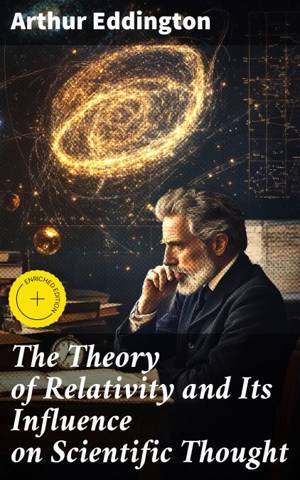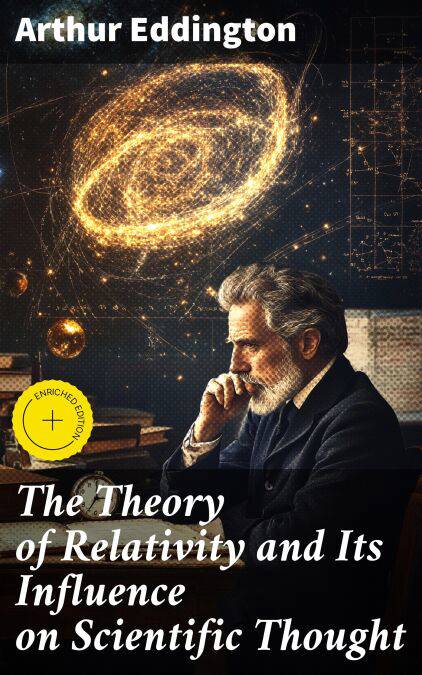
Bedankt voor het vertrouwen het afgelopen jaar! Om jou te bedanken bieden we GRATIS verzending (in België) aan op alles gedurende de hele maand januari.
- Afhalen na 1 uur in een winkel met voorraad
- In januari gratis thuislevering in België
- Ruim aanbod met 7 miljoen producten
Bedankt voor het vertrouwen het afgelopen jaar! Om jou te bedanken bieden we GRATIS verzending (in België) aan op alles gedurende de hele maand januari.
- Afhalen na 1 uur in een winkel met voorraad
- In januari gratis thuislevering in België
- Ruim aanbod met 7 miljoen producten
Zoeken
The Theory of Relativity and Its Influence on Scientific Thought E-BOOK
Enriched edition. Unraveling Einstein's Theory and Transforming Science
Arthur Eddington
E-book | Engels
€ 1,99
+ 1 punten
Uitvoering
Omschrijving
In "The Theory of Relativity and Its Influence on Scientific Thought," Arthur Eddington contextualizes Einstein's groundbreaking work within the landscape of early 20th-century physics. Eddington's prose is characterized by clarity and precision, making complex concepts accessible to both academics and laypersons alike. He delves into the philosophical implications of relativity, exploring its challenge to classical mechanics and its ability to reshape understandings of time and space. This work not only highlights the scientific advancements that were borne from relativity but also its cultural reverberations, suggesting a profound shift in human thought and perception. Arthur Eddington, a prominent British astrophysicist and philosopher of science, was one of the first to elucidate Einstein's theories to the English-speaking world. His background in both physics and philosophy uniquely positioned him to appreciate the deeper implications of relativity. Eddington's commitment to scientific inquiry and his experiences in World War I, during which he reflected on the relationship between science, society, and ethical responsibility, undoubtedly informed his perspective in this book. Eddington's illuminating work is essential for anyone interested in the interplay of science and philosophy. It is an invaluable resource for scholars, students, and curious readers alike, offering insights into how revolutionary ideas can transform not only scientific paradigms but also the very framework through which humanity interprets its existence.
In this enriched edition, we have carefully created added value for your reading experience:
- A succinct Introduction situates the work's timeless appeal and themes.
- The Synopsis outlines the central plot, highlighting key developments without spoiling critical twists.
- A detailed Historical Context immerses you in the era's events and influences that shaped the writing.
- An Author Biography reveals milestones in the author's life, illuminating the personal insights behind the text.
- A thorough Analysis dissects symbols, motifs, and character arcs to unearth underlying meanings.
- Reflection questions prompt you to engage personally with the work's messages, connecting them to modern life.
- Hand‐picked Memorable Quotes shine a spotlight on moments of literary brilliance.
- Interactive footnotes clarify unusual references, historical allusions, and archaic phrases for an effortless, more informed read.
In this enriched edition, we have carefully created added value for your reading experience:
- A succinct Introduction situates the work's timeless appeal and themes.
- The Synopsis outlines the central plot, highlighting key developments without spoiling critical twists.
- A detailed Historical Context immerses you in the era's events and influences that shaped the writing.
- An Author Biography reveals milestones in the author's life, illuminating the personal insights behind the text.
- A thorough Analysis dissects symbols, motifs, and character arcs to unearth underlying meanings.
- Reflection questions prompt you to engage personally with the work's messages, connecting them to modern life.
- Hand‐picked Memorable Quotes shine a spotlight on moments of literary brilliance.
- Interactive footnotes clarify unusual references, historical allusions, and archaic phrases for an effortless, more informed read.
Specificaties
Betrokkenen
- Auteur(s):
- Uitgeverij:
Inhoud
- Aantal bladzijden:
- 25
- Taal:
- Engels
Eigenschappen
- Productcode (EAN):
- 4064066301842
- Verschijningsdatum:
- 10/04/2021
- Uitvoering:
- E-book
- Beveiligd met:
- Digital watermarking
- Formaat:
- ePub

Alleen bij Standaard Boekhandel
+ 1 punten op je klantenkaart van Standaard Boekhandel
Beoordelingen
We publiceren alleen reviews die voldoen aan de voorwaarden voor reviews. Bekijk onze voorwaarden voor reviews.









